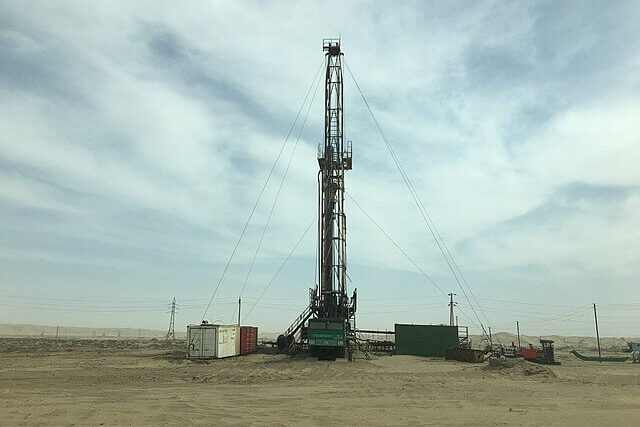
Satellite data has revealed that methane leaks from Turkmenistan’s main fossil fuel fields caused more global heating in 2022 than the entire carbon emissions of the UK.
The emissions of methane, a potent greenhouse gas, from the oil and gas-rich country are described as “mind-boggling” and an “infuriating” problem that should be relatively easy to address, according to experts. The data, produced by Kayrros for the Guardian, shows that the western fossil fuel field in Turkmenistan leaked 2.6 million tonnes of methane in 2022, while the eastern field emitted 1.8 million tonnes. Combined, the two fields released emissions equivalent to 366 million tonnes of CO2, surpassing the annual emissions of the UK, which is the 17th-largest emitter globally.
Since 2007, methane emissions have seen alarming growth, posing a significant threat to limiting global heating to below 1.5°C. The surge in methane emissions also raises concerns about triggering catastrophic climate tipping points. Turkmenistan is identified as the worst country in the world for methane leaks, with “super-emitting” leaks being a major issue. Some of these leaks are believed to be the result of switching from flaring methane to venting it directly into the atmosphere, which releases the potent gas without burning it. Methane has a much higher heat-trapping potential than CO2, making venting significantly worse for the climate.
Experts see the upcoming Cop28 UN climate summit hosted in the United Arab Emirates as an opportunity to address methane-cutting action in Turkmenistan. The UAE and Turkmenistan have close ties, and there is pressure on the UAE to demonstrate that a major oil and gas producer can achieve strong outcomes from the summit.
Reducing methane leaks from fossil fuel sites is considered the fastest and most cost-effective way to mitigate methane emissions and combat global heating. Taking action to address leaks can often pay for itself, as the captured gas can be sold. However, experts note that the maintenance of infrastructure in Turkmenistan is lacking.
“Methane is responsible for almost half of short-term [climate] warming and has absolutely not been managed up to now – it was completely out of control,” said Antoine Rostand, the president of Kayrros.
“We know where the super emitters are and who is doing it,” he said. “We just need the policymakers and investors to do their job, which is to crack down on methane emissions. There is no comparable action in terms of [reducing] short-term climate impacts.”
The satellite data used to detect methane emissions in Turkmenistan shows a steady trend since 2019, and it has identified 840 super-emitting events, where individual wells, tanks, or pipes leak methane at a rate of a few tonnes per hour or more. Most of these emissions come from facilities owned by Turkmenoil, the national oil company. Undetected methane emissions are also expected from offshore oil and gas installations in the Caspian Sea, although the ability of satellites to measure such leaks over water is still being developed.
Turkmenistan is China’s second-largest supplier of gas and plans to double its gas exports to the country. Despite the vast gas resources available, Turkmenistan is vulnerable to the impacts of the climate crisis, including severe drought and declining crop yields. While speaking openly about the repressive state is challenging, sources emphasise the urgency of addressing methane leaks in Turkmenistan, highlighting the country’s potential to become the world’s largest reducer of methane emissions. They criticize the lack of action, attributing it to a lack of care as long as the gas resources continue to flow. Despite President Serdar Berdimuhamedov’s previous statements on reducing emissions, addressing leaks does not appear to be a priority in Turkmenistan. Recent scientific research identifies the west coast of Turkmenistan as one of the largest methane hotspots globally, with satellite data indicating long-standing emissions from flare stacks and pipeline leaks managed by state companies.
The continuous and significant methane leaks in Turkmenistan highlight the urgent need to address this issue and implement measures to reduce emissions. Efforts to curb these leaks can have a substantial impact on global heating, making it a crucial area of focus for climate action.
——————————————————————————
At Natural World Fund, we are passionate about stopping the decline in our wildlife.
The declines in our wildlife is shocking and frightening. Without much more support, many of the animals we know and love will continue in their declines towards extinction.
When you help to restore a patch of degraded land through rewilding to forests, meadows, or wetlands, you have a massive impact on the biodiversity at a local level. You give animals a home and food that they otherwise would not have had, and it has a positive snowball effect for the food chain.
We are convinced that this is much better for the UK than growing lots of fast-growing coniferous trees, solely to remove carbon, that don’t actually help our animals to thrive.
This is why we stand for restoring nature in the UK through responsible rewilding. For us, it is the right thing to do. Let’s do what’s right for nature!
Support our work today at https://naturalworldfund.com/ and join in the solution!

